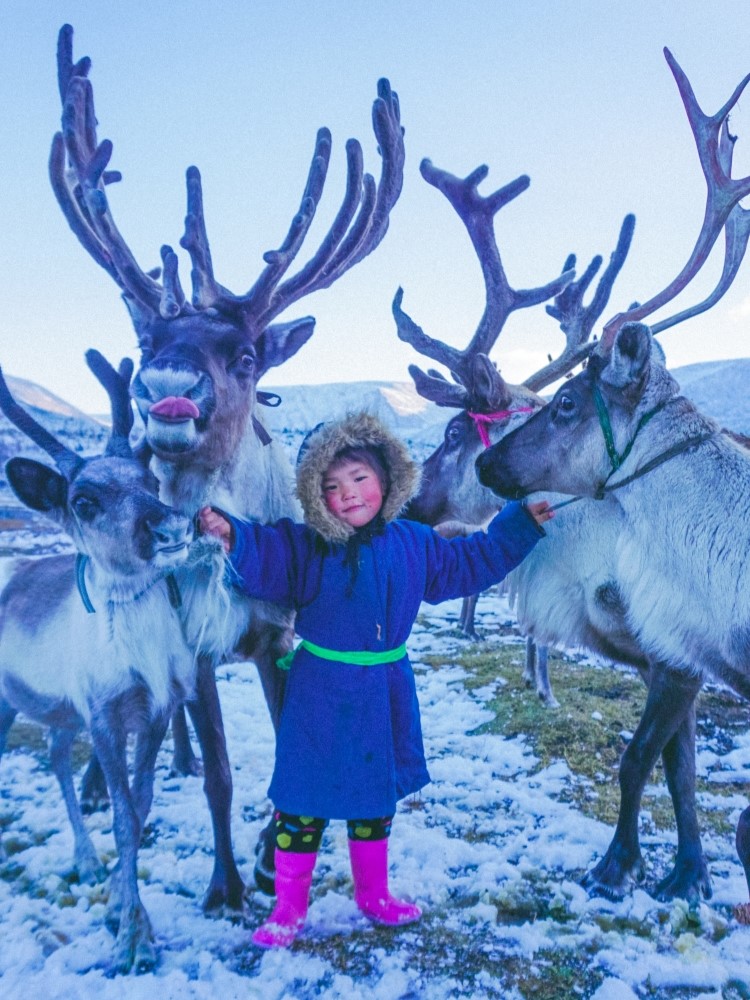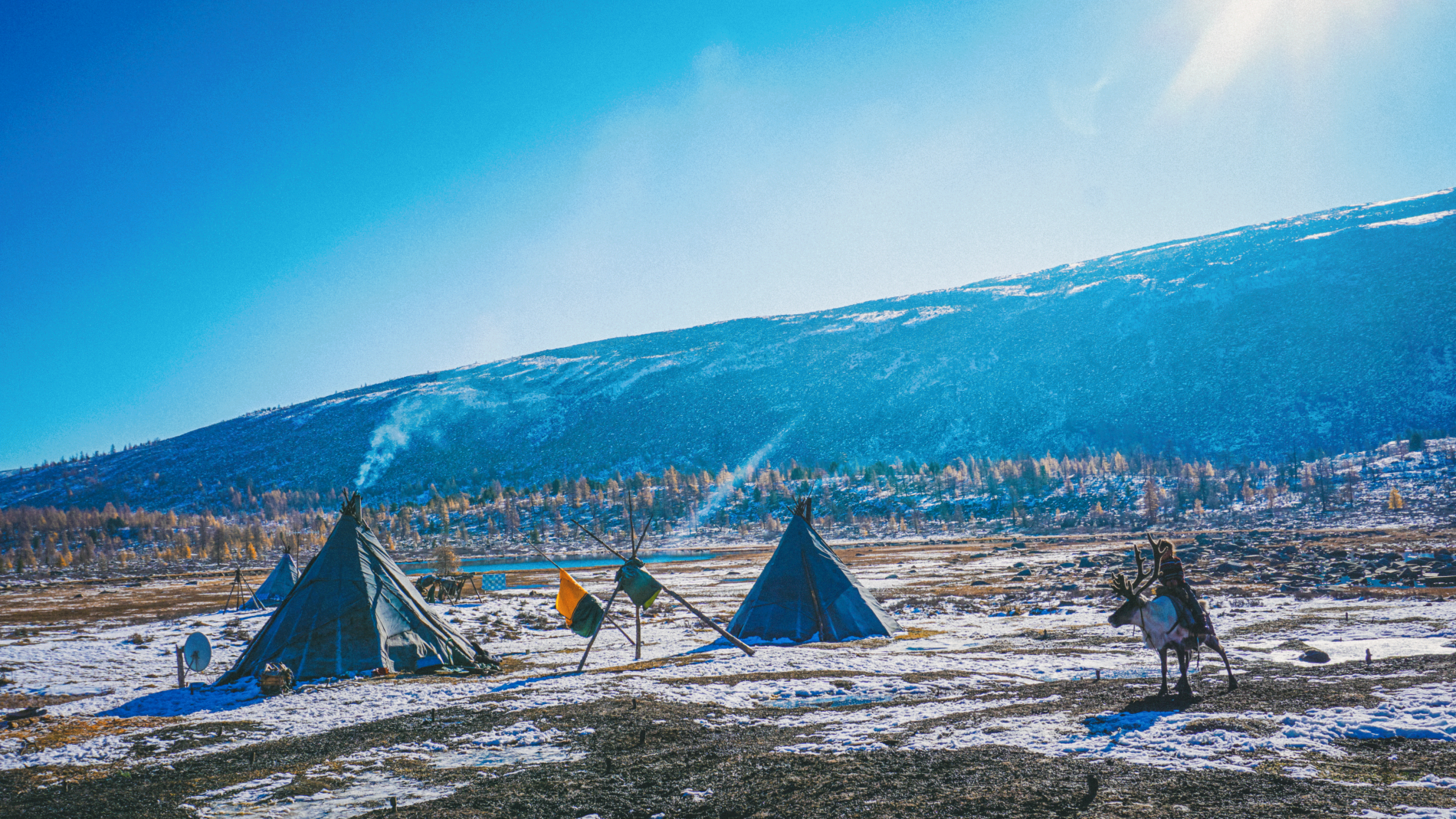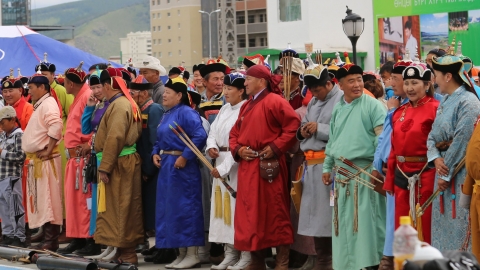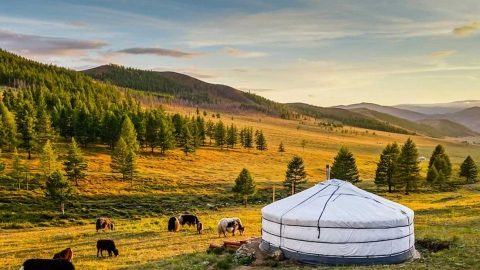Deep within the taiga forests, in remote settlements, lives the oldest reindeer tribe. The Tsaatan were originally a small community of reindeer herders from the Tuva region of southern Russia. They later settled in Mongolia and dispersed to various areas of the plains to graze their reindeer. Tsaatan settlements still exist today in both the western and eastern taiga regions.
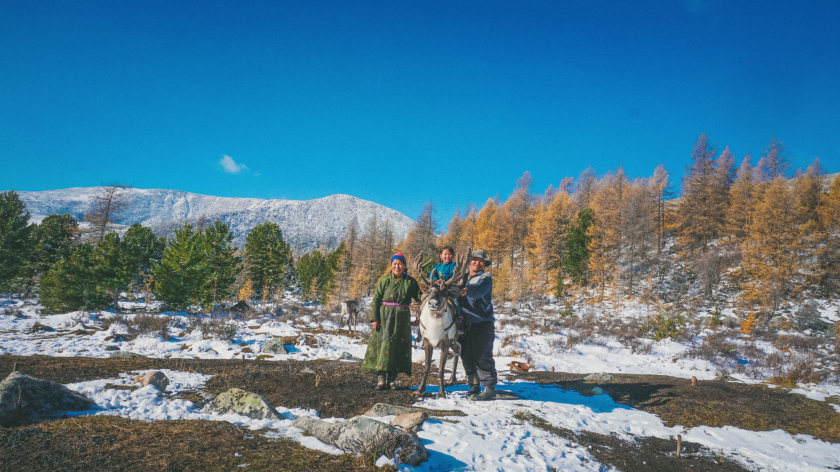
In remote farms nestled deep within the taiga forest lives the oldest reindeer tribe.
The world's last primitive tribe
The reindeer herders eventually chose to live in isolation from the outside world. Their home is the uncharted plateaus in the taiga forests northwest of Lake Khövsgöl. The tribe migrates during the transitional seasons, and as the weather warms, they venture deeper into the freezing -40°C climate to ensure their reindeer have a healthy environment. They accept living in harsh conditions, just as their primitive ancestors did. For them, reindeer and nomadic culture are sacredly connected, a thread that stretches through time to trace back to the ancient origins of humankind.
That's why nomadic people never eat reindeer unless the animal is no longer able to move. They domesticated and raised them, and thus, reindeer became deeply ingrained in their lives, becoming their source of livelihood. When they get old and die, their hides are used for clothing and shoes, their antlers are used for medicinal purposes or to decorate graves, and reindeer hides cover their tents. And their meals are always subtly scented with warm reindeer milk.
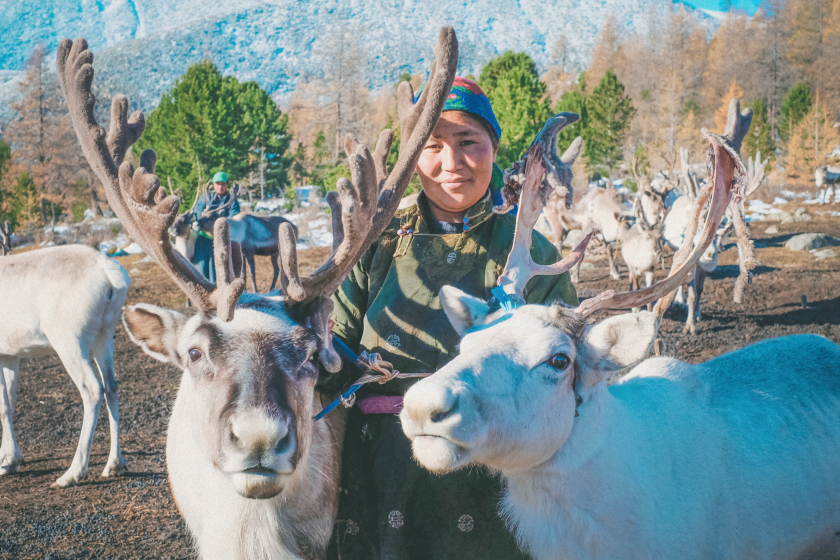
For the Tsaatan people, reindeer and nomadic culture are profoundly sacred, a thread that stretches through time to trace back to the ancient origins of humankind.
The name Tsaatan is how the Mongolians refer to this nomadic tribe; Tsa means reindeer, and Tan means "people." However, the "reindeer people" prefer to call themselves Dukkha in their mother tongue. The Tsaatan still preserve their language; they speak Tuvinian, a language from the Baikal region with no commonalities with Mongolian. However, the Tsaatan are incredibly hospitable and always have connections outside their community, so it's not difficult to find an interpreter, or even a Mongolian tour guide, who speaks Vietnamese.
On their journey to the tribe, most tourists will stop at traditional Mongolian encampments called Ger, while the Tsaatan people live in orts, or teepees. During each migration, hundreds of reindeer accompany the people on this great journey. The Tsaatan leave behind the wooden posts, and only tarpaulins and basic supplies are loaded onto the strongest reindeer. Each Tsaatan, from the oldest to the youngest member of the tribe, rides their favorite reindeer and begins their journey through the vast taiga forest.
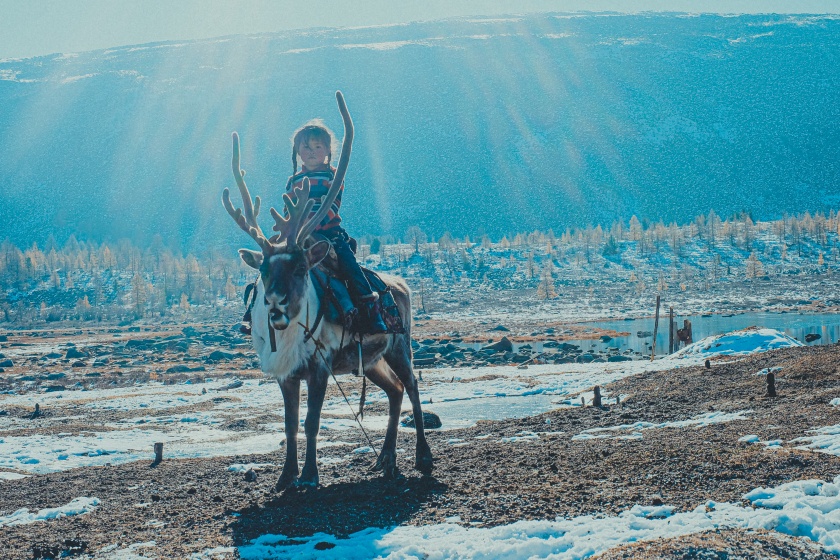
During migrations, from the oldest to the youngest members of the tribe, they will ride their favorite reindeer and begin their journey across the vast taiga forest.
Despite maintaining their traditional lifestyle, the Tsaatan people welcome the influence of modernity. Much of their food is brought in from Ulaan-Uul on the west side of Lake Khövsgöl, where the Tsaatan minority's administrative center is located. Children aged six and older are sent to the village of Tsagaan Nuur for schooling and return home during the summer holidays. In the summer, some families choose to take their children with them as they migrate deeper into the forest, while others leave them in Tsagaan Nuur due to the significant temperature differences between day and night. Tourists visiting the tribe also face a difficult journey on horseback through muddy terrain caused by melting ice, which softens the forest floor.
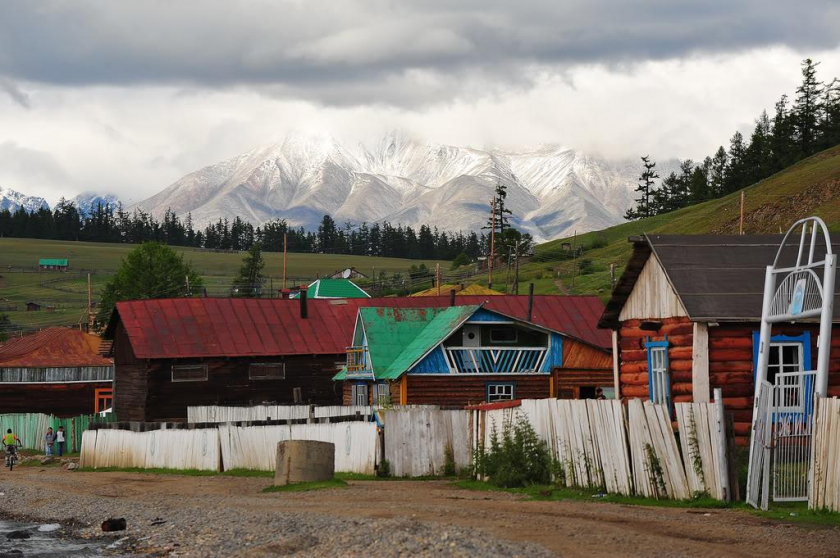
Modern-style houses in Tsagaan Nuur village.
A challenging journey for both tourists and tour organizers.
When winter arrives, Tsaatan families move closer to the edge of the forest, and tourists can travel directly by car to the pristine and beautiful tents of this nomadic tribe. However, Mongolia is almost devoid of tourists in winter, and tourist camps close for the winter due to temperatures ranging from -30 to -40 degrees Celsius. Because of this harsh environment, many tour companies can only allow tourists to visit reindeer raised on tourist farms during the summer.
To prepare for an adventurous journey, Mai Huong, founder and operator of the experiential backpacking project, said: "To reach the reindeer tribe, the tour organizers like us need to prepare a comprehensive support team. First, local tour guides will contact the Tsaatan family to determine their location. Importantly, the guides must be familiar with the terrain, weather, language, and possess basic first aid and medical skills to assist guests in case of emergencies. Once inside the taiga forest, people are completely isolated from the outside world. In addition, guides and drivers must know how to cook to ensure passengers receive proper nutrition. Next, the group will need professional horse handlers. These handlers need to be skilled at leading horses, familiar with the terrain, and understand their horses well to ensure the safety of the tourists."
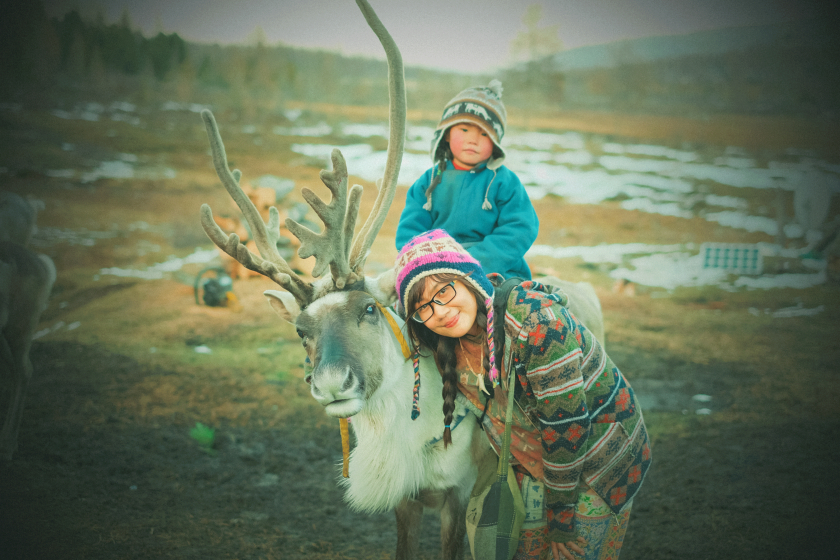
Ms. Mai Huong, founder and director of the experiential backpacking tourism project.
During winter trips, to safely navigate the harsh -40°C weather, travelers need to prepare all necessary warm clothing and heat patches. Because the temperature difference between day and night is quite large, ranging from -10°C to -40°C, maintaining a fire for warmth will be crucial.
"There were days when it was -37 degrees Celsius outside, but it was always warm inside the tent. The drivers always set alarms to wake up and tend to the heaters to keep the whole group warm. Sometimes I even felt hot," shared Diep Anh, a female tourist who had just returned from Mongolia.
But no matter how good the support is, visitors to Mongolia need to be in good health and have an adventurous spirit. The Tsaatan tribe is not a tourist attraction, so they cannot provide you with tourist amenities, not even basic utilities like electricity, water, and internet. As nomadic pastoralists, the Tsaatan welcome tourists to their community as a way to support the tribe in maintaining their traditional way of life. At the same time, visitors must always respect the tribe's culture and living environment. Once you stay with a Tsaatan family, you will sleep in simple traditional tents like them and drink from the same spring water.
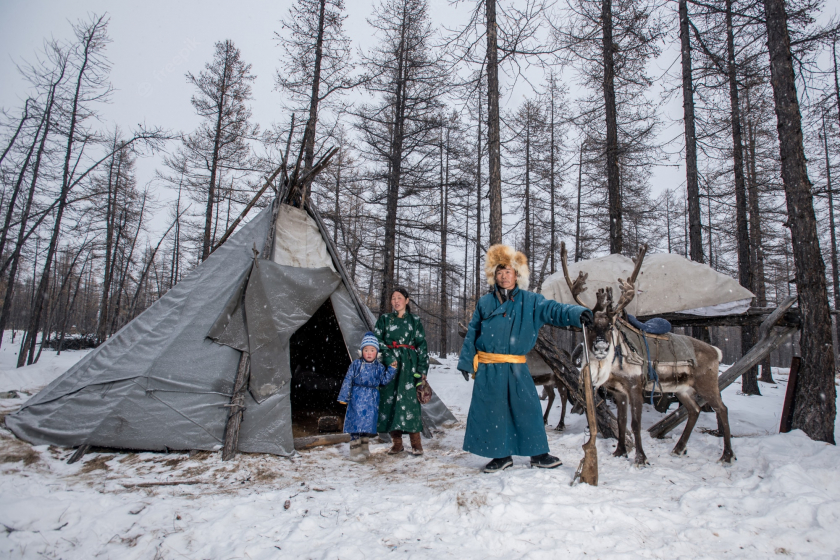
As nomadic pastoralists, the Tsaatan people welcome tourists to their community as a way to support the tribe in continuing to maintain their traditional way of life.
And when you leave behind the conveniences of the 21st century, the scene you wake up to each morning is pine forests covered under a pristine white blanket of earth and sky, the only noise here is the squeaking of reindeer, and the only worry of the locals is losing a reindeer in the fields.
Among the group of tourists returning from Mongolia, Ms. Nguyen Thi Hue is a 60-year-old traveler. She shared with Travellive: "The children in the group just returned and are already discussing coming back here in the summer. So I will definitely come back because this trip was truly the most amazing trip of my life."

 VI
VI EN
EN



